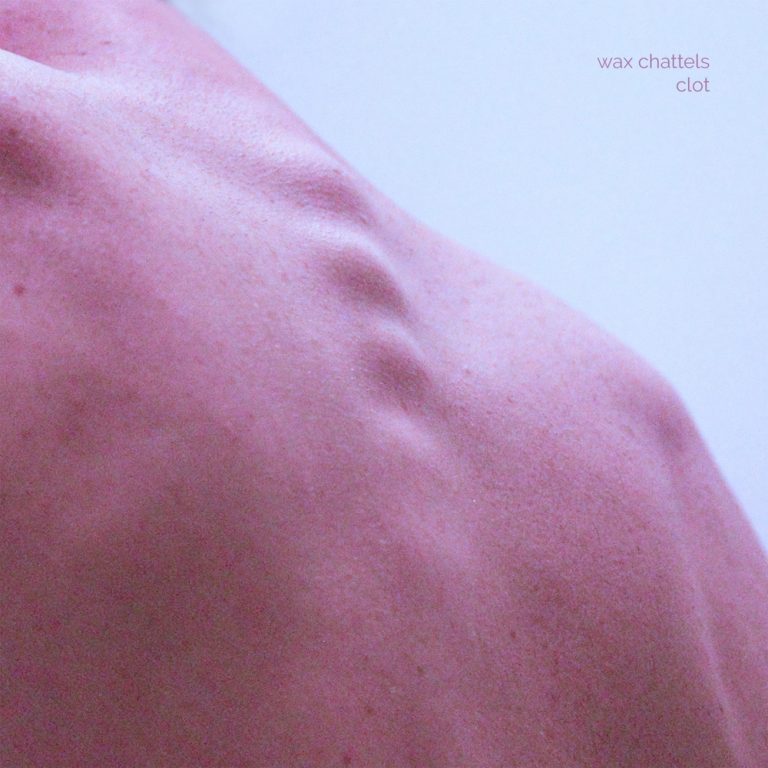The first thing that anyone will usually note about New Zealand post-punks Wax Chattels is the makeup of the band: you will be told that they are a three-piece consisting of only a bass guitar (Amanda Cheng), a keyboardist (Peter Ruddell), and a drummer (Tom Leggett); you will be told of their tagline, “guitarless guitar music.” A similar thing happened in 2014, when Royal Blood’s debut album prompted much preemptive excitable chatter; they were just a duo – Mike Kerr on an extremely modified bass and Ben Thatcher on drums – and they had the British press ablaze with their guitarless rock. What they didn’t have, though, were impactful tracks to make their nicheness worthwhile; playing without a guitarist is a difficult endeavour.
As their second album Clot shows, though, this isn’t as much a problem for Wax Chattels. It’s a resounding follow-up to their 2018 self-titled debut, which first caught international attention. It’s loud and dark and intimidating and never lacks for atmosphere. Even the name of the album feels apt, for to listen to it is to feel like one is on the verge of bursting a Clot; such is the ferocity and ferality of the noise.
The members of Wax Chattels all have a jazz school background and this firmly informs their sound. There are sublime jazz fills throughout, the percussion constantly in a concentrated dance with the snarling snapshot vocals. As a trio, they are unimpeachably precise and tight. What doesn’t come from their jazz grounding, though, is the unrelenting energetic noise of Clot. Over 11 tracks, they produce a maximalist wall of sound that is a force of power and tone. The band have become synonymous with their overwhelming live shows and it’s uncomplicatedly evident as to why; simply imagine this punishing and frenetic noise in a low basement venue. They’ve clearly tried to maintain as much of that raw feeling as possible on record, but some of the viscerality will always be lost in capturing it on tape.
Things kick off with “Glue” which is, appropriately, an ode to drummers and their dedication to their cause, often at the expense of their own health. It’s a bruising exemplar, Leggett’s aggressive staccato drumming dominating and sounding almost painful. Following track “Efficiency” begins with what sounds like an alarm system on the fritz. The anxiety-inducing effect feels purposeful, as it does throughout; “If you talk more, you’ll get what you want / Volume over clarity of content,” Cheng professes.
Clot bears no concrete semblance of genre. There is much of the jittery coldness of 2010s post-punk; their jazz leanings have been discussed; and in the incessant thrash, there are also often hints of metal. Indeed, Cheng and Ruddell’s vocal styles constantly teeter on the verge between spoken-word and screamo. During the abrasive shoegaze interjection of “Spanners & Implements”, the menace in Ruddell’s voice threatens some visceral release of violence. On the ominous “Forever Marred”, Cheng’s soft and unnerving delivery matches the hesitant rhythm, before the tension gives way into the explosive climactic howl of Ruddell. They combine on “An Eye”, a sharp riposte against police brutality, their dark and brooding harmonising growing in fearsomeness.
Identity is the overarching theme of Clot, particularly on two notable songs. “Cede” is a denunciation of the Chinese Communist Party for its cultural genocide and militant harassment of its neighbouring states, something Cheng has had to watch helpless from afar. It’s suitably fiery and angry, reminiscent of the Prodigy’s “Firestarter”. Cheng also sings the chorus in her native language of Taiwanese Hokkien, a pointed act of identity.
Another standout, “No Ties” is about the experience of being a first-generation immigrant, where Cheng considers the loneliness that permeates the existence of those families like her own who have moved away from their homeland. “You chose for me,” is the repeated frustrated chorus line; “Only blood, not friends / History, not mine,” is the severe melancholy contained in the first verse.
Wax Chattels’ own collective identity is similarly of interest. There can be few clearer examples in the world than New Zealand of a country being so dominated by one idea of their musical sound. Certainly abetted by their relative isolation and smallness, the place is so identified with the output of Flying Nun Records. Wax Chattels’ style is a total repudiation of this classic notion of New Zealand music however: gone is the jangle that Flying Nun propagated to the independent music scene and made them so renowned from the 1980s onwards; gone completely, of course, are the guitars that brightened and signified that sound.
Wax Chattels have become one of New Zealand’s biggest breakouts in recent times – on Flying Nun’s roster no less – precisely due to their contrasting idiosyncrasy. Just as Cheng is of New Zealand and not, so too is the band’s music. Identity is truly a hard thing to find, but Wax Chattels are definitely on the way to locating theirs.

